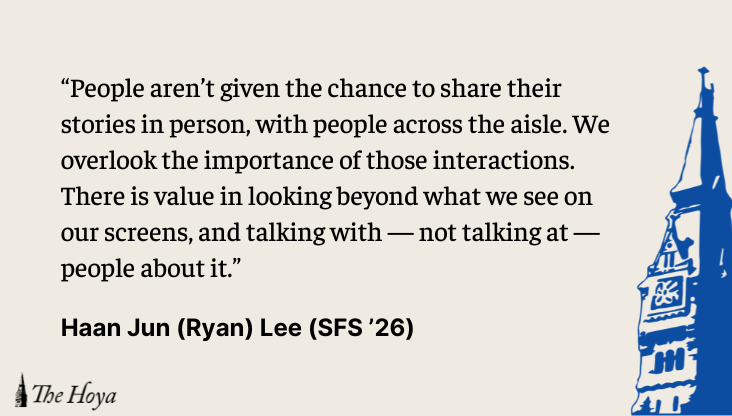Here at Georgetown, I’ve had plenty of discussions regarding political polarization, and they usually converge at two conclusions. First, polarization is harmful and we need to talk about it. Second, social media is a main factor in exacerbating this divisiveness.
I am not rejecting these discussions, nor am I hoping to discredit these valid opinions. In fact, the conclusions mentioned are well-supported: numerous polls show that Americans think the country is divided at alarming levels, and additional studies have reported on social media’s role in perpetuating echo chambers.
Yet, I still want to challenge the notion that social media is a primary cause of a divided America. The effects of social media are overplayed in discourse about polarization, and have become the default scapegoats. Instead, I find us — the people — at fault for the immense polarization the U.S. sees today. We must work towards painting a political picture composed of real people, not just the content on our phones.
On July 27, 2023, a series of articles were published in the Science and Nature magazines that analyzed the impact of Facebook and Instagram on the public’s political attitudes during the 2020 election. By partnering with Meta — the owner of Facebook and Instagram — each article studied thousands of users to see if altering feeds could shift political beliefs. The changes in media feeds included blocking reshared posts, displaying reverse chronological algorithms instead of the default and decreasing exposure to “like-minded” content (i.e., content that shares political views with the user) by one-third.
Surprisingly, all of the articles found that modifying social media feeds had minimal effect. Each study concluded that their altered algorithms made no significant change in the level of polarization or ideological divide detected in users.
These conclusions don’t necessarily mean that social media companies are entirely off the hook. Social media platforms still contribute to the spread of disinformation and divisive content. However, the results of the studies yield some food for thought on how impactful social media actually is.
Ultimately, the studies shed light on a fact we easily overlook: it’s not social media accounts that steer politics. It’s the people behind the accounts that do. Yet, instead of interpersonal discourse, social media is how we largely engage with each other in the status quo.
To effectively address the issue, we have to stop placing the blame solely on social media. Rather, we should all reflect on our personal, direct influence. If people are polarized, then both the blame and responsibility are on us, the people.
Let’s go back to that classroom, where students are talking about polarization and social media. Despite the numerous concerns raised about media-derived polarization, many students find themselves returning to those same platforms with the same consumption habits.
In an era where social media is essential to engaging with the world, we are trapped in an endless cycle of seeing the news and discussing politics online. People aren’t given the chance to share their stories in person, with people across the aisle. We overlook the importance of those interactions. There is value in looking beyond what we see on our screens, and talking with — not talking at — people about it.
There are multiple opportunities that students can pursue at Georgetown, from student coalitions to speech and debate societies. I have been fortunate to work with the Institute of Politics and Public Service and its fellows to host open, off-the-record political discussions every week.
I urge students to actively seek similar opportunities.
There was an experiment conducted by the New York Times in 2019 that I love because it showcases the effects of the changes I’m advocating for. They gathered 526 voters from across the country — representing diverse voter demographics — to spend a weekend together.
Throughout the weekend, they just talked amongst one another — not arguing about their most charged political beliefs but sharing intimate anecdotes of how political issues affected them personally. Participants, one by one, opened up about how the same issues benefited them or left them worse off, from the Affordable Care Act to steep tariffs on China.
Some changed their political beliefs, and others didn’t. But overall, the participants, both left and right, edged toward the center and found common ground. But that wasn’t what struck me the most.
Instead, the scenes of engagement and bonding were what left a noticeable impact on me. In what the article described as “unlikely pairings of people,” participants became friends. Regardless of age, race, or hometown, they just talked, spending time together and buying drinks for each other. That is what’s missing in digital political discourse today: being human.
Haan Jun (Ryan) Lee is a sophomore in the School of Foreign Service.














